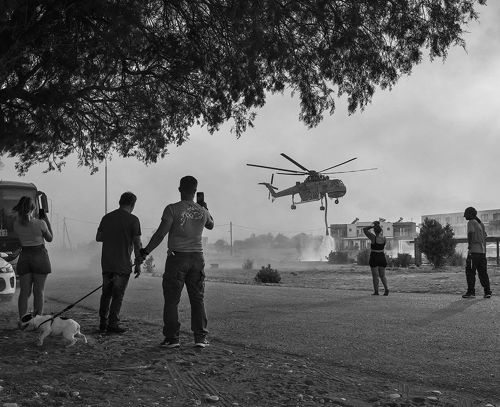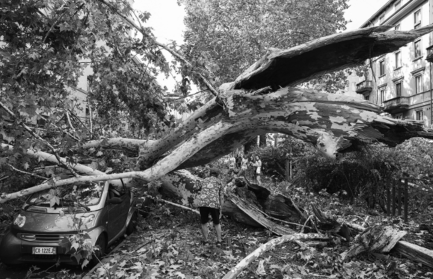Europe faces nature's wrath
Climate change concerns mount as heat, storms batter region

The fingerprints of climate change are all over the intense heat waves gripping the globe this month, a new study on Tuesday finds.
Researchers say the deadly hot spells in areas, including Europe, could not have happened without the continuing buildup of warming gases in the air.
Researchers at World Weather Attribution find that the unusually strong heat waves are becoming more common.
A stagnant atmosphere, warmed by carbon dioxide and other gases, made the European heat wave 2.5 C hotter, the study found.
Thousands of people have been evacuated from the Greek islands of Rhodes and Corfu as wildfires wreak havoc across the country, while a blaze in Sicily, Italy, forced the closure of its Palermo airport.
Europe recorded its hottest day so far this year on Monday, with 48 C measured in Sicily.
While southern Italy struggled under the oppressive heat, most of the northern area was hit by thunderstorms and oversized hail.
Media reports said the emergency services in Milan had responded to more than 200 requests for help related to flooding, fallen trees, and damage to cars and homes since a severe storm hit the city late on Monday.
Elsewhere in Lombardy, a 16-year-old girl was killed when storms toppled a tree that fell on the tent where she was sleeping during a camping trip.
On Monday, an aircraft that took off from Milan for New York was seriously damaged by hail, and had to be rerouted to Rome for an emergency landing.
Other parts of the north, including the regions of Trentino-Alto Adige, Friuli Venezia Giulia, Piedmont, and Veneto, were also hit hard by storms.
Temperatures in Greece have exceeded 40 C this month, with fires burning for nearly a week in some areas.
British travel companies canceled flights to Rhodes this week as wildfires continued to rage for the seventh day on the Greek island.
Concerns are also mounting that escalating winds and high temperatures could intensify the fires across the nation, reported The Times newspaper. It said authorities remain on alert, with more than 270 firefighters reported to be trying to contain 82 wildfires across Greece, 64 of which started on Sunday.
Agence France-Presse reported that around 2,500 people were also being evacuated from the island of Corfu, some 1,027 kilometers away, while the island of Crete is also now reported to be at "extreme risk" of wildfires.
Raging wildfires in Greece turned deadly on Tuesday when a firefighting plane crashed, killing two pilots. A third person was found dead as relentless heat waves fueled flames.
Thousands of vacationers have arrived back in the United Kingdom from Rhodes, and returned on repatriation flights, with an estimated 10,000 Britons still believed to be on the island, as of early Tuesday.
The BBC reported that travel companies, including Jet2, Thomas Cook, EasyJet and Tui, have suspended outbound package holidays to Rhodes.
More hard days warned
Sky News cited a wildfires expert who said poorly managed land and the effects of climate change have created "more flammable landscapes" on Greek islands.
During a debate in Parliament, Greece's Prime Minister Kyriakos Mitsotakis warned islanders and holidaymakers to prepare for at least three more hard days. "We are at war — completely focused on the fires," he said. "Over the coming days and weeks, we must remain on constant alert."
He also said climate change "will make its presence ever more felt with greater natural disasters throughout the Mediterranean region".
Firefighting planes from Turkiye joined the effort to tackle the fires on Rhodes on Monday.
Fires also swept across Portugal and Spain's Gran Canaria.
Scientists have described extreme heat as a "silent killer" taking a heavy toll on the poor, the elderly and those with existing medical conditions.
Research published this month said as many as 61,000 people may have died in Europe's sweltering heat waves last summer, suggesting preparedness efforts are falling fatally short.
The heat has also caused large-scale crop damage and livestock losses, the World Weather Attribution scientists said, with US corn and soybean crops, Mexican cattle and southern European olives all severely affected.
Residents of Milan were surveying the mess after the dramatic overnight storm and winds of over 100 kilometers per hour. "It all happened around 4 or 5 am this morning, it was very short but very intense, it knocked down several trees … with the wind gusts they took off and broke up," witness Roberto Solfrizzo, 66, told Reuters.
Agencies contributed to this story.


Today's Top News
- Beijing slams Washington's treatment of Chinese students
- Xi to attend SCO Tianjin Summit, host relevant events
- AI role key in stimulating consumption
- Discovering truths about happiness on roof of world
- 60 years of progress marked
- The prospects for Cambodia-China cooperation






























